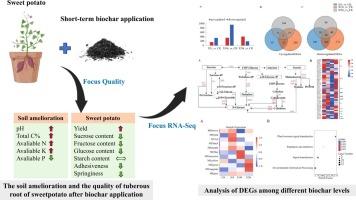Transcriptome analysis reveals the impact of short-term biochar application on starch and sucrose metabolism in sweet potato tuberous roots
IF 5.6
1区 农林科学
Q1 AGRICULTURAL ENGINEERING
引用次数: 0
Abstract
Biochar has been proven to be an effective method for enhancing sweet potato yield. However, limited research has been conducted on the molecular and physiological mechanisms underlying biochar's regulation of starch biosynthesis. This study aimed to investigate the transcriptome sequencing, which revealed the effects of short-term biochar application (STBA) on tuberous roots of sweet potato and the. We designed four STBA treatments: 0 t·hm−2 (CK), 5 t·hm−2 (X5t), 10 t·hm−2(X10t), and 20 t·hm−2(X20t), through a comprehensive analysis encompassing physiological data and RNA-seq analysis. The investigation included a comprehensive analysis integrating physiological measurements with RNA-seq data to elucidate the underlying mechanisms. The results showed that STBA enhanced the availability of nitrogen and potassium significantly, while also elevating the soil's pH levels. The 20 t·hm−2 STBA substantially enhanced sweet potato yields by 72.21 %, and the starch content of all STBA was not significantly different with CK. STBA decreased the sucrose, starch, glucose, and fructose content of tuberous root by 3–12 %, 1–5 %, 5–8 %, and 5–16 %. DEGs analysis identified distinct gene regulation patterns following biochar treatments, with the 5–10 t·hm−2 dosages predominantly down-regulating genes, including those in starch and sucrose metabolism pathways. WGCNA analysis uncovered 11 modules, highlighting biochar's influence on hormone signal transduction pathways, which was validated through qRT-PCR of five key genes. The study's findings light on the impact of STBA on the starch quality of sweet potatoes and inform biochar application strategies in agriculture.

转录组分析揭示短期施用生物炭对甘薯块根淀粉和蔗糖代谢的影响
生物炭已被证明是提高甘薯产量的有效方法。然而,有关生物炭调控淀粉生物合成的分子和生理机制的研究还很有限。本研究旨在通过对转录组测序的研究,揭示短期施用生物炭(STBA)对甘薯块根和淀粉生物合成的影响。我们设计了四种 STBA 处理:我们设计了四种 STBA 处理:0 t-hm-2 (CK)、5 t-hm-2 (X5t)、10 t-hm-2 (X10t) 和 20 t-hm-2 (X20t)。这项研究包括一项综合生理测量和 RNA-seq 数据的全面分析,以阐明其潜在机制。结果表明,STBA 能显著提高氮和钾的供应量,同时还能提高土壤的 pH 值。20 t-hm-2 STBA 使甘薯产量大幅提高了 72.21%,所有 STBA 的淀粉含量与 CK 没有显著差异。STBA 使块根的蔗糖、淀粉、葡萄糖和果糖含量分别降低了 3-12%、1-5%、5-8% 和 5-16%。DEGs 分析确定了生物炭处理后不同的基因调控模式,5-10 t-hm-2 剂量主要下调基因,包括淀粉和蔗糖代谢途径中的基因。WGCNA分析发现了11个模块,凸显了生物炭对激素信号转导途径的影响,并通过对5个关键基因的qRT-PCR进行验证。研究结果揭示了 STBA 对甘薯淀粉质量的影响,并为生物炭在农业中的应用策略提供了参考。
本文章由计算机程序翻译,如有差异,请以英文原文为准。
求助全文
约1分钟内获得全文
求助全文
来源期刊

Industrial Crops and Products
农林科学-农业工程
CiteScore
9.50
自引率
8.50%
发文量
1518
审稿时长
43 days
期刊介绍:
Industrial Crops and Products is an International Journal publishing academic and industrial research on industrial (defined as non-food/non-feed) crops and products. Papers concern both crop-oriented and bio-based materials from crops-oriented research, and should be of interest to an international audience, hypothesis driven, and where comparisons are made statistics performed.
 求助内容:
求助内容: 应助结果提醒方式:
应助结果提醒方式:


